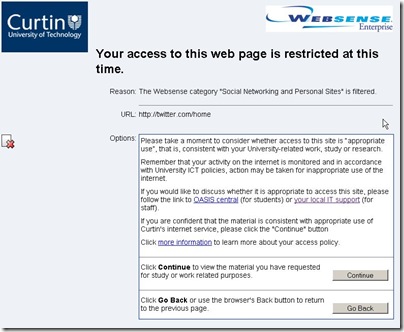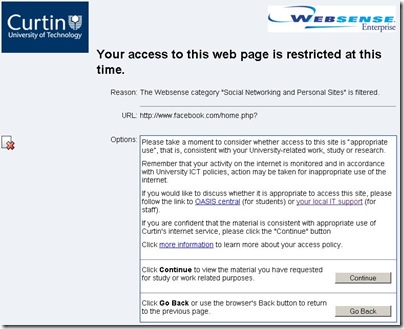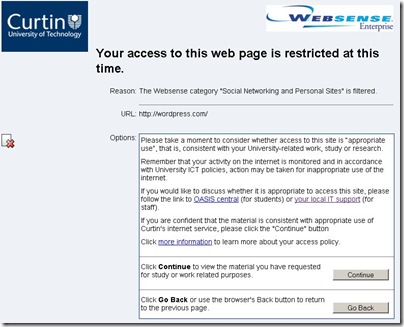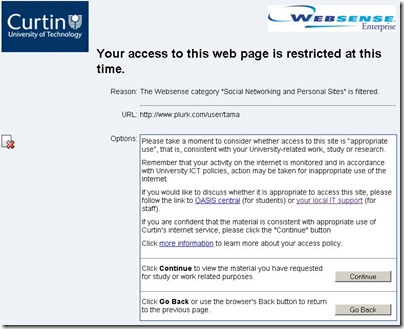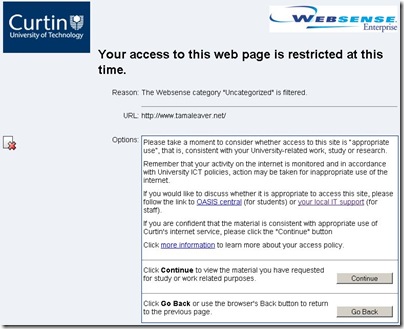Home » Posts tagged 'censorship' (Page 3)
Tag Archives: censorship
Digital Culture Links: January 19th 2010
Links for January 18th 2010 through January 19th 2010:
- Android Karenina [Quirk] – What a great idea of a mashup novel! "Sense and Sensibility and Sea Monsters co-author Ben H. Winters is back with an all-new collaborator, legendary Russian novelist Leo Tolstoy, and the result is Android Karenina—an enhanced edition of the classic love story set in a dystopian world of robots, cyborgs, and interstellar space travel."
- New law could block access to anime, manga and slash fan sites in Australia [fanthropology] – A look at what Australian’s proposed Internet Censorship laws could mean for slash, manga and anime fans: in short, not good!
- Call for study of threat from "offline" filesharing [The Guardian] – Anyone remember pre-internet “piracy”? Time to scan USBs and harddrives at customs 😛 "Policymakers urgently need better information on people’s attitudes to copyright law, according to a report out today warning that friends swapping hard drives and memory sticks could pose as great a piracy threat to media companies as online filesharers. The Strategic Advisory Board for Intellectual Property (Sabip): "There’s a whole big question here around what is happening offline digitally, the swapping of discs and data in that world. There’s a lot of it going on," said Sabip board member Dame Lynne Brindley. Brindley, chief executive of the British Library, said existing research did not give a clear picture of consumer behaviour. While there was some data on the proportion of people buying counterfeit CDs, DVDs and video games – estimated at between 7% and 16% of the population – Sabip was concerned that more needed to be known about other copyright breaches, such as hard-drive swapping …"
- Seven launches online catch-up, PLUS7 [TV Tonight] – "Seven today launched its online catch-up portal, PLUS7. The site offers legal streaming of Seven shows including Grey’s Anatomy, Home and Away, FlashForward, Private Practice, Heroes, Castle, Better Homes and Gardens, Parks and Recreation and more. As with the ABC’s iView, the site does not require a show to finish downloading before being available to start play. The site includes “mid-roll advertising” to show advertisements mid programme, much like commercial television. A spokesperson previously told TV Tonight they expect around 3-4 ads per show. Titles will remain online for between 7 – 28 days depending on rights. So far no ISPs are yet on board for unmetered content. The site can be viewed at au.tv.yahoo.com/plus7." (As expected, Plus7 is geo-locked, so only visible inside Australia. Sorry Brits, you’ll have to wait for Home and Away!)
Digital Culture Links: January 13th 2010
Rather Google-centric links January 13th 2010:
- Google ‘may end China operations over Gmail breaches’ [BBC News] – “Internet search company Google says it may end operations in China over alleged breaches of the e-mail accounts of Chinese human rights activists. It said it had found a “sophisticated and targeted attack on our corporate infrastructure originating from China”. It did not specifically accuse China’s government but said it was no longer willing to censor its Chinese site’s results, as the government requires. Google said the decision may mean it has to shut the site, set up in 2006.” Google’s certainly showing some real guts; read their official statement.
- Google finally enters the online storage arena with a free 1GB [Technology | guardian.co.uk] – With the announcement that Google are now supporting online file storage of any file-type via Google Docs the fabled GDrive appears one step closer! Jack Schofield examines Google’s online storage foray: “First, as Google says, you will be able to share files that Google Docs can’t handle, presumably including avi and MP3. That is clearly useful. Second, Google Docs can be a problem for companies sharing Microsoft Office files, because the features you lose when you convert to Google’s formats you can never get back. Google Docs storage will now let people share those files. And third…. Google is planning to launch ChromeOS, where computers run a Chrome browser but have no permanent local storage: everything is done “in the cloud”. Google probably does not plan to tell those folks to go somewhere else to store their files, so at that point it will need an online storage offering.”
- Uni staff migrate to the cloud [The Australian] – “More universities are set to follow Macquarie and outsource staff email to parties such as Google’s Gmail, with Curtin University close to a deal with Microsoft. About 14 Australian universities have already outsourced their student email to Gmail or Microsoft’s Live@edu service, but this week Macquarie became the first to migrate staff to the so-called cloud in a deal with Gmail. The cloud is jargon for the outsourcing of email and data services to external providers that host the data on servers that can be located across the world. Concerns about the security of intellectual property and academic privacy had made universities cautious about moving staff to the cloud. But Macquarie’s chief information officer Marc Bailey said the likes of Google and Microsoft offered vastly superior security to a university.” (Given how frustrating current arrangements can be, I welcome a cloud-based email system for Curtin staff!)
- Google Plans to Upgrade Old Billboards in Street View [RW Web] – Google’s street view becomes a virtual advertising landscape! Inspired by Minority Report perhaps? “According to a new patent that was just granted to Google, the company could soon extend the reach of its advertising program in Google Maps to Street View. This patent, which was originally filed on July 7, 2008, describes a new system for promoting ads in online mapping applications. In this patent, Google describes how it plans to identify buildings, posters, signs and billboards in these images and give advertisers the ability to replace these images with more up-to-date ads. In addition, Google also seems to plan an advertising auction for unclaimed properties. In Google’s example, the software could identify the marquis and individual window posters on a theater property and replace them with new information. Through this, a theater could promote a new play in Street View, even if the actual Street View image is completely out of date.”
Digital Culture Links: December 18th 2009
Links for December 16th 2009 through December 18th 2009:
- Privacy groups challenge Facebook on new settings [BBC News] – “Ten privacy groups in the US have filed a complaint to the Federal Trade Commission over Facebook’s new privacy settings. They argue that privacy on the social networking site has been adversely affected as the firm encourages users to open up their profiles. The company changed its privacy settings, ostensibly to make it easier for users to control their profiles. But it also made it easier for content to be shared with all Facebook users. The idea that personal photos and comments can be seen by all 350 million Facebook users has angered privacy groups. The complaint, filed by the Electronic Privacy Information Center and signed by nine other privacy groups, argues that the recent changes “adversely impact users”. Facebook’s changes to users’ privacy settings disclose personal information to the public that was previously restricted,” the complaint read. “
- Microsoft admits code theft for Chinese blog Juku [BBC News] – “Microsoft has indefinitely suspended its Chinese microblogging service MSN Juku after admitting that it “copied” code used to create the site. A vendor contracted to work for the software giant was caught lifting code from a rival Canadian start-up, Plurk. According to Plurk as much as 80% of the basecode was “stolen directly”. Microsoft apologised to Plurk, saying “we are obviously very disappointed but we assume responsibility for this situation”.”
- Child groups slam Conroy’s ISP filtering plans – internet content filtering, mandatory internet fitering, National Children’s and Youth Law Centre (NCYLC), Save the Children [Computerworld] – Children’s rights groups have spoken out against the Federal Government’s plans to introduce mandatory ISP-level filtering, saying it will not effectively protect children. International child rights group, Save the Children, said while it congratulates the government on its attempt to improve the safety of children online, an ISP-level filter is not the best way to offer protection. Child rights specialist, and organisation spokesperson, Dr Annie Pettitt, said it would be more appropriate for the government to educate children and families about appropriate and safe Internet use. “The filter could lull parents into a false sense of security thinking that it is working, but we know hackers are always ahead of those filtering technologies,” Pettitt said. “We could be left in a situation where we think that the filter is sorting out stuff, when in fact it’s not.””
Australian Internet Censorship: No Thanks.

Earlier today I was interviewed by Damien Smith on RTR FM’s morning magazine talking about the Australian Federal Government’s plan to introduce national internet censorship. As you might imagine, I’m not a fan of the plan, and think its the thin edge of a very large, potentially very conservative and encompassing censorship programme. Feel free to listen to the interview, or grab the direct mp3 download, but more than that, please take a look at this material and judge the plan for yourself:
- The Official Report on the ISP Filtering Trial in Australia by Enex
- Net censorship trial report brings more questions than answers by EFA
- Google Australia’s Response to the Internet Filter Plans
- An open letter to Stephen Conroy by Eric Pinkerton
- Welcome to National Censorship Day by David Braue
If you think this is a poor plan for Australia, please let your voice be heard.
Australia’s Compulsory Internet Censorship
Kevin Rudd’s Australian government: maybe one step forward; definitely fifty steps backward.
Digital Culture Links: September 21st 2009
Links for September 18th 2009 through September 21st 2009:
- RIP Facebook Beacon [Mashable] – “Facebook launched its ad platform “Beacon” in Nov 2007, hoping to revolutionize advertising by posting updates to your Facebook profile when you interacted with its partner sites. This week Facebook said that it has settled a class-action lawsuit against the product, agreed to shut it down completely, and will establish a $9.5 million “settlement fund” to fund initiatives related to online privacy. … Facebook Beacon was a system that posted your activity on third-party websites – Blockbuster, Gamefly, Overstock.com and more – back to your Facebook profile. Privacy advocates rallied against it, however, arguing that data was being sent without the users’ explicit permission. The situation worsened after a report claimed that Beacon was collecting data from partner sites regardless of whether users were Facebook members …” (Beacon remains one of those most teachable examples of Facebook’s privacy woes, but I’m delighted with the idea of money being spent privacy initiatives.)
- Nigeria ‘offended’ by sci-fi film [BBC NEWS | Africa] – “Nigeria’s government is asking cinemas to stop showing a science fiction film, District Nine, that it says denigrates the country’s image. Information Minister Dora Akunyili told the BBC’s Network Africa programme that she had asked the makers of the film, Sony, for an apology. She says the film portrays Nigerians as cannibals, criminals and prostitutes. An actor from the film said that it was not just Nigerians who were portrayed as villains. … But Mr Khumbanyiwa said Nigerians in the cast did not seem worried by the portrayal of their country. He suggested that the film, which depicts people wanting to eat aliens to gain the superhuman powers, should not be taken too literally. “It’s a story, you know,” he said. “It’s not like Nigerians do eat aliens. Aliens don’t even exist in the first place.”” (Well said, Mr Khumbanyiwa, well said.)
- Welcome to the (anonymous) rabbit hole [Unleashed] – Mark Pesce’s playful take on the largely unsuccessful attempts by Anonymous to take down the ACMA and Australian Prime Minster’s websites on 09/09/09/
- VICTORY: FCC to Mandate Net Neutrality for the Web [Mashable] – “The Federal Communications Commission has been in the middle of it, as it has outlined loose net neutrality guidelines in the past. But according to The Wall Street Journal, the FCC is about to propose definitive rules that could have major repercussions for the entire web. The new rules, expected to be announced Monday by Julius Genachowski, the FCC Chairman, will outline requirements for ISPs to treat all traffic on the Internet equally. This means that Comcast can’t decide that Google gets less bandwidth and Microsoft/Bing (Bing) gets more for any reason (i.e. one pays for preferential treatment). It’s also expected that the net neutrality rules will apply to wireless services, meaning they would be in effect for Internet data via your phone and 3G networks. The impact of this cannot be understated, especially as iPhones and other smart phones make the mobile web a major part of our lives.” (Excellent!)
- Google slams Murdoch plan to charge for online news [The Age] – “Publishers of general news would find it hard to charge for their content online because too much free content is available, the chief executive of Google said. Speaking to a group of British broadcasting executives via video link, Eric Schmidt said he could, however, imagine niche providers of content such as business news succeeding in this area. Schmidt was responding to an announcement by News Corp CEO Rupert Murdoch that he could start charging for content online. “In general these models have not worked for general public consumption because there are enough free sources that the marginal value of paying is not justified based on the incremental value of quantity,” he said. “So my guess is for niche and specialist markets … it will be possible to do it but I think it is unlikely that you will be able to do it for all news.””
- Meme Analysis: Kanye Interrupts, the Internet (and Obama) Listens [NewTeeVee] – Everything you ever wanted to know about the Kayne West interrrupts Taylor Swift meme …
Digital Culture Links: September 3rd 2009
Links for September 2nd 2009 through September 3rd 2009:
- Copyright protection without the court action [Blogs – Twisted Wire – ZDNet Australia] – An excellent little podcast looking at the challenges challenges to copyright in the digital age, but more importantly exploring alternative distribution models which could circumvent many of the current big media strategy of litigation against a few file-sharers. Comments from Nic Suzor (Australia's Electronic Frontiers Australia), Peter Coroneos (Internet Industry Association (IIA)) and Mike O'Donnell, (CEO of iCopyright in the US). Amazingly, the idea of having better, quicker, more efficient ways to buy movies over the web was one of the main ideas put forward! 🙂 (See also the previous week's show & podcast where AFACT argued with Suzor and Coroneos about the role of ISPs in policing the content viewed by Australian internet users.)
- Web2.0 tools for Gov2.0 beginners: a practical guide [Centre for Policy Development] – A useful beginner's guide looking at web 2.0 tools and social media in relation to campaigning and building links and conversation between government and citizenry in particular ways. Gives a solid sense of the benefits and potential barriers with each platform mentioned. Written by Barry Saunders.
- YouTube Said to Be in Talks on Pay Movies [NYTimes.com] – "YouTube, the largest video site, is in negotiations with major Hollywood studios for a deal that would let its visitors pay to watch full-length movies, according to two people briefed on the negotiations. If an agreement is reached, it would be a major change for YouTube, which has built a huge audience by offering an eclectic collection of free video clips and earns most of its revenue from advertising. It would also put YouTube, which is owned by Google, in direct competition with services from Netflix, Amazon and Apple, which allow users to buy or rent movies online." (YouTube's creep away from a primary focus on supporting user-generated content continues …)
- Media favours Coalition, study finds [ABC News (Australian Broadcasting Corporation)] – "Newspapers are left wing, television is right wing, and the media as a whole tends to favour the Coalition. And surprisingly, according to researchers from the Australian National University, the ABC Television news is the most pro-Coalition of them all. Former Liberal prime minister John Howard railed against the alleged left-wing bias of the ABC, but the researchers found Aunty was more likely to favour his side. Researchers pored over news stories from 1996 to 2007 to establish if the media was biased. The results, released today, point to the media being generally middle-of-the-road, with the coalition tending to win out."
- Conroy urged to 'end net censorship farce' [The Age] – "The Federal Government's internet censorship trials have been repeatedly delayed over the past nine months, leading to claims from the Opposition that the Government is deliberately withholding the results to avoid embarrassment. The Opposition's communications spokesman, Nick Minchin, today called on the Communications Minister, Stephen Conroy, to "end this farce and produce his long overdue trial results for independent assessment". Live trials of the filtering policy, which is intended to block "prohibited content" for all Australians as determined by a secret Government blacklist, were initially slated to begin in December last year and take about six weeks. They were then pushed back until July, then September and, today, the Government is still unable to put a date on when it will release the results to the public."
- TV facing 'iTunes moment' warns Microsoft's Ashley Highfield [Media | guardian.co.uk] – "The TV industry has as little as two years to create viable digital businesses or face a version of the "iTunes moment" that saw the music business cede the online future to Apple, according to Ashley Highfield. Highfield, the the managing director of consumer and online at Microsoft UK, said he believed the reluctance advertisers feel to advertise on sites such as Facebook will soon be a "non-issue", putting more pressure on broadcasters' advertising revenues. "Once this happens the shift of spending from TV to web will accelerate even more," he said, giving the Futureview address at the MediaGuardian Edinburgh International Television Festival today. "So realistically I think the industry has about two to three years to adapt or face its iTunes moment. And it will take at least that long for media brands to build credible, truly digital brands. But, importantly, I do believe TV does have a small two to three year window in which to respond.""
Annotated Digital Culture Links: June 12th 2009
Links for June 10th 2009 through June 12th 2009:
- Find Creative Commons Images in Google Image Search [Google OS] – "Google Image Search added the option to restrict the results to images that are licensed using Creative Commons, a list of flexible licenses that allow content creators to share their works with the world. The options aren't yet available in the interface, but you can use the search box below to find images that are licensed using some of the most popular Creative Commons licenses…" (I'm looking forward to this being implemented in the advanced search options, it'll make finding CC images even easier!)
- UK CVN Killer Flu – Killer Flu game; not bad at breaking past the pandemic hype and seeing how different types of flu can and can't spread and mutate: "Killer Flu!! Or, maybe, “non-killer flu” to describe the current outbreak of swine flu! Here is a game that allows you to learn more about how the influenza virus is transmitted and how it changes every year – which explains why you can get more than one dose of the flu over your lifetime and why vaccines need changing every year. We also hope it will be a bit of fun."
- Facebook racial taunts [WA Today] – "A rapidly expanding social networking site has been slammed for its racist taunts against immigrants to Australia. The Facebook Group, F*** Off, We’re Full, has nearly 65,000 members and believes any immigrants coming to Australia must adapt to what it calls the ‘Aussie lifestyle.’ “This idea of Australia being a multicultural community has served only to dilute our sovereignty and our national identity,” the site states. “As Australians, we have our own culture, our own society, our own language and our own lifestyle.” The website is full of debate on its discussion board. The latest topics put up for comment include: Will Indian race-rioters be hunted down? and All foreigners need to be euthanised." (Another disheartening reminder that racism is all too alive in this day and age.)
- Twitterers defy China's firewall [BBC NEWS | Asia-Pacific] – "On the eve of the 20th anniversary of the Tiananmen killings, social networking sites such as Twitter and the photo-sharing site Flickr were blocked in China in an attempt by the government to prevent online discussion on the subject. But Chinese twitterers proved that there are ways to get round the great firewall of China. … Besides the Tiananmen anniversary itself, what seemed to be most important to Chinese twitterers was the blocking of sites. Advice on how to access Twitter – by using a proxy, VPN (virtual private network) or Hotspot shield – spread around quickly. While some were clearly annoyed at this interference, others did not lose their sense of humour. One user congratulated his fellow twitterers with "Happy Chinese Internet Maintenance Day!"."
Annotated Digital Culture Links: March 30th 2009
Links for March 25th 2009 through March 30th 2009:
- Vintage DHARMA ads.[Flickr] – An outstanding set of fan-made ads for the more banal side of Lost‘s Dharma Initiative! By Adam Campbell [Via io9]
- Shooter video games ‘sharpen vision’ [News.com.au] – “Slaying hordes of bad guys in fast-paced video games improves vision, a study has shown for the first time. Far from being harmful to eyesight, as some had feared, action games provide excellent training for what eye doctors call contrast sensitivity, the study found. Contrast sensitivity is the ability to notice tiny changes in shades of grey against a uniform background, and is critical to everyday activities such as night driving and reading. It often degrades with age. The findings, published in Nature Neuroscience, reveal a previously unsuspected adaptability in the brain, and could open the way to new therapies, the researchers said.” (This week, video games are good! 🙂
- When Stars Twitter, a Ghost May Be Lurking – NYTimes.com – “The rapper 50 Cent is among the legion of stars who have recently embraced Twitter to reach fans who crave near-continuous access to their lives and thoughts. On March 1, he shared this insight with the more than 200,000 people who follow him: “My ambition leads me through a tunnel that never ends.” Those were 50 Cent’s words, but it was not exactly him tweeting. Rather, it was Chris Romero, known as Broadway, the director of the rapper’s Web empire, who typed in those words after reading them in an interview. “He doesn’t actually use Twitter,” Mr. Romero said of 50 Cent, whose real name is Curtis Jackson III, “but the energy of it is all him.” … someone has to do all that writing, even if each entry is barely a sentence long. In many cases, celebrities and their handlers have turned to outside writers — ghost Twitterers, if you will — who keep fans updated on the latest twists and turns, often in the star’s own voice.” (If you need a ghostwriter for 140chars, you’re not trying!)
- Conroy admits blacklist error, blames ‘Russian mob’ [SMH] – “The Communications Minister, Stephen Conroy, has admitted that Bill Henson images were added to the communications regulator’s list of prohibited websites in error, while blaming the addition of a dentist’s site to the blacklist on the “Russian mob”. Meanwhile, the website of the Federal Government’s censorship body, the Classification Board, was hacked last night and defaced with an anti-censorship screed. The admission by Senator Conroy on ABC television’s Q&A program last night casts significant doubt on the Government’s ability to filter the internet without inadvertently blocking legitimate websites. Q&A was inundated with 2000 questions from the public about the Government’s hugely unpopular policy, and the audience last night ridiculed Senator Conroy by laughing at a number of his responses.”
- YouTube Being Blocked in China, Google Says [NYTimes.com] – “Google said Tuesday that its YouTube video-sharing Web site had been blocked in China. Google said it did not know why the site had been blocked, but a report by the official Xinhua news agency of China on Tuesday said that supporters of the Dalai Lama had fabricated a video that appeared to show Chinese police officers brutally beating Tibetans after riots last year in Lhasa, the Tibetan capital. Xinhua did not identify the video, but based on the description it appears to match a video available on YouTube that was recently released by the Tibetan government in exile. It purports to show police officers storming a monastery after riots in Lhasa last March, kicking and beating protesters. It includes other instances of brutality and graphic images of a protester’s wounds. According to the video, the protester later died.”
Curtin’s Internet Filtering and Blocking
How much does your educational institution filter the internet, especially if you’re at tertiary level (because K-12 filtering has other issues attached to it)? I ask because in my recent shift to Curtin, I’ve discovered the joys of university-level internet filter, something that didn’t happen at my previous institution. The list of blocked or click-thru site (ie not completely blocked, but having a warning message asking if you really need this website) seems to alter week to week. This morning, every time I want to visit Twitter, Plurk, Facebook or even a wordpress.com blog, I have to click through a warning page; every time I reload, I have to click through a warning page. Apart from being highly frustrating, I’m currently redesigning several units which are thematically linked by the concept of web presence; almost everything I want students to look at will have these warnings on the Curtin network. I wonder how many students will get frustrated and give up on the unit? This morning’s blocks so far …
Ironic Update: The first attempt to upload this blog post from my work computer led me to discover that even this website is blocked now:
I wonder what sort of hoops I’m going to have to jump through to try and fix this? 🙁
Update 2: Most of the blocking seems to have magically stopped as suddenly as it began about 12 hours ago so, being generous, I’d like to believe this was an accidental blocking … I’d really like to believe that …

